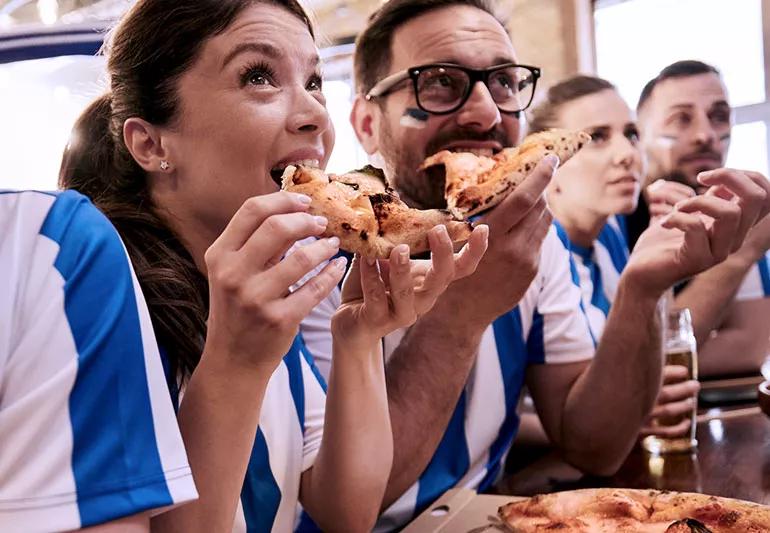Emotions can power food choices when your favorite team falls short

Three seconds remain on the clock as your beloved football team lines up for what should be a game-winning field goal. It’s a chip shot sort of kick … the kind that splits the uprights 99% of the time.
Advertisement
Cleveland Clinic is a non-profit academic medical center. Advertising on our site helps support our mission. We do not endorse non-Cleveland Clinic products or services. Policy
But today is that 1%. The kick hooks wide right to finalize another heartbreaking loss for your team. It’s a painful outcome that hurts your team in the standings.
It also might not be good for your diet. Research shows that tough losses on the football field often lead to poor mealtime choices and overeating the following day. (Talk about a game weighing on you!)
To learn more about this food-based fumble, we turn to health psychologist Grace Tworek, PsyD.
Researchers spent two NFL seasons analyzing the eating habits of fans the day after games. Pulling up the instant replay on their findings shows that:
Those food choices following a win or loss illustrate the enormous influence that sports hold over our lives and emotions. Other studies have found connections between big games and heart attacks.
Advertisement
Let’s face the facts: Seeing your team lose is a bummer. So, when the scoreboard tells a sad tale, many fans seek comfort food to ease the pain and anxiety. (Think baked goods and greasy fast food menu items.)
“It may not change the outcome, but it allows you to feel better or even serve as a distraction for a brief moment,” explains Dr. Tworek.
Emotional eating is a common coping mechanism — and there’s a biological reason behind it.
When you feel stressed or upset, your body cranks up the production of a hormone called cortisol. This surge of cortisol naturally makes you crave sugary, fatty foods that deliver a soothing effect.
So, when your favorite quarterback tosses an interception at the goal line, you might be tempted to reach for an extra handful of chips. (Or eat the whole bag.)
Your team winning, on the other hand, seems to boost good choices and self-control. “You feel good about the game and connected to those around you,” says Dr. Tworek. “This may make reaching for food as a method to cope much less appealing.”
Want to avoid overeating after a tough loss? Then it’s best to get a game plan together. (And maybe if your team had taken the same approach ahead of the game, this wouldn’t even be an issue for you.)
“Preparing yourself ahead of time no matter the outcome can make a big difference,” says Dr. Tworek.
Here are three things to try:
Bottom line? Don’t throw a penalty flag if you downed an XL “meatza pizza” to soothe your soul after your team lost. It’s just one bad day of eating after one bad game by your team.
“Make it a learning experience,” advises Dr. Tworek. “Take note of what hasn’t worked well in the past versus what has worked well — and use this to inform future situations and develop a set of effective coping skills.
Advertisement
Then, you’ll be ready for the next time your team takes one on the chin. Because as you know from watching football, success is all about making mid-season adjustments.
Advertisement
Learn more about our editorial process.
Advertisement

This color additive, found in many pre-packaged foods, may affect people with ADHD or allergies

With a focus on internal cues for hunger and fullness, this eating style may revolutionize your relationship with food

Review the ingredients, watch for sugar and fat, and choose one with the right amount of protein for your needs

Getting the hang of portions can help you better understand how much to put on your plate

A typical recommended balanced diet is half fruits and veggies, a quarter protein and a quarter grains

Foods high in protein, fiber and water can help keep hunger at bay

This quirky food trend is harmless, as long as you’re getting enough protein, fiber and healthy fats

With a little planning, you can fill your belly and boost your energy

The tropical fruit is a good source of antioxidants and vitamin C

Most people fall asleep within 10 to 20 minutes, but if your experience is different, adjusting your sleep schedule may help

Exploring your hidden side can lead to better understanding of what makes you tick